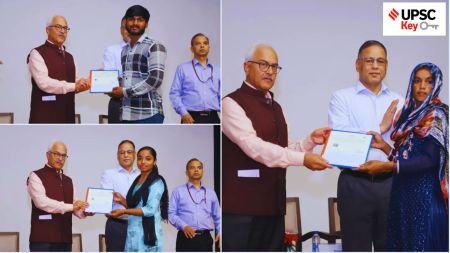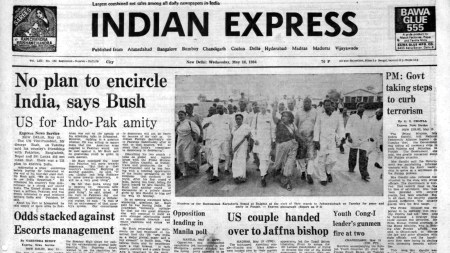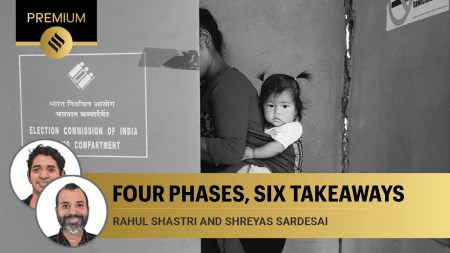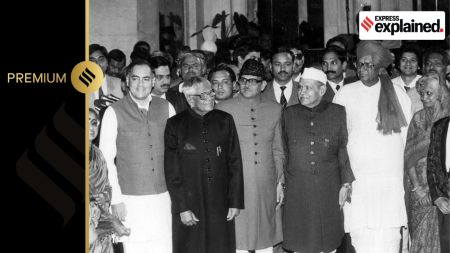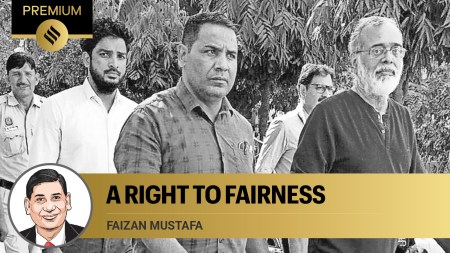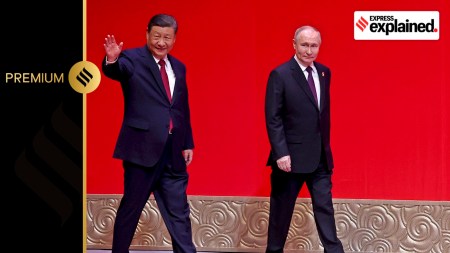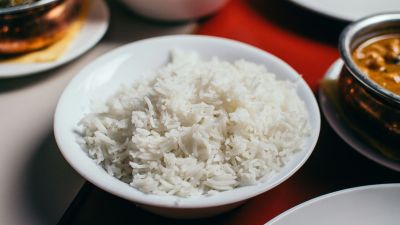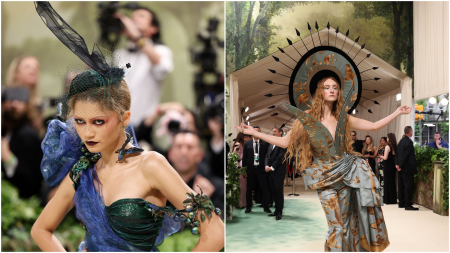- India
- International
The queen of khayal and thumri Shubha Mudgal on the evolution of classical music: ‘It is not the artists we need to motivate, but listeners’
"As for motivating youth to take up classical music, I can say with certainty and pride that we have scores of extremely talented and dedicated youngsters studying and performing music in the country…," said Shubha Mudgal.
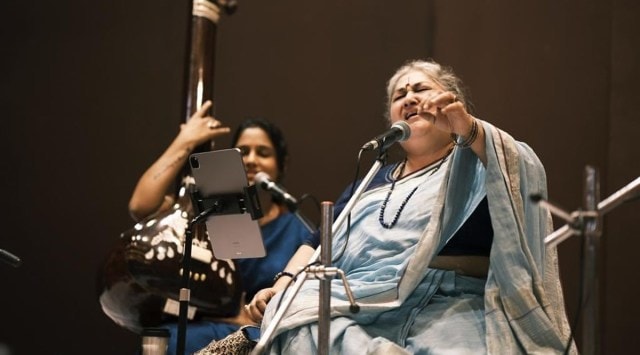 Shubha Mudgal, a prominent Indian classical vocalist, opened the Parampara Series festival in Delhi. (Source: Shubha Mudgal/Instagram)
Shubha Mudgal, a prominent Indian classical vocalist, opened the Parampara Series festival in Delhi. (Source: Shubha Mudgal/Instagram) Celebrating 27 years of its annual classical music and dance festival, Natya Tarangini is hosting the Parampara series from October 6 to 8. Founded by the senior Kuchipudi dancer-duo — Drs Raja Radha Reddy and Kaushalya Reddy — the illustrious festival is a significant platform for performing arts, which beckons dancers and musicians from diverse genres.
Talking about the festival’s history and significance, Dr Raja Reddy said, “We began the Parampara festival many years ago to promote our Indian treasures of dance, music, and arts. Our country is known all over the world for natya and sangeetam, and to maintain the tradition, we wanted to spread the knowledge of dance and music to coming generations.”
Despite the challenges posed by the pandemic in 2020, Natya Tarangini adapted swiftly and presented its last two festivals virtually. This transition not only allowed for a broader reach but also garnered tremendous audience appreciation from around the world. However, with a return to normalcy, this year’s event is being presented to a live audience.
Dr Raja Reddy reflected on the positive side of the pandemic’s impact, stating, “Covid-19 actually helped us a lot by allowing us to present our dance online and widened our audience. I feel that instead of disappointment, we should look at the positive side of things. Our number of students from different parts of the world also grew.”
View this post on Instagram
The Parampara series aims to honour the timeless tradition or ‘Parampara’ of India — known as the “Gyanbhoomi”. The festival invites seasoned artists to provide a rich cultural experience to the audience. This year, notable singers such as Shubha Mudgal, Fareed Hasan Khan, and Mehboob Hussain Khan are among the participants.
Shubha Mudgal, a prominent Indian classical vocalist, opened the festival. In an interview with indianexpress.com, the queen of khayal and thumri talked about her journey, her inspiration, the evolution of classical music, and much more. Read the edited excerpts below:
What were your earliest musical influences?

Mudgal: My formal training in music started only when I was about 17 years old, but as a child, my mother would teach me many kinds of compositions and songs. I think one of the earliest compositions she taught me was Tulsidas ji’s famous bhajan ‘Thumaki chalat Ramchandra, bajat painjaniya…’ She was a great admirer of Pt DV Paluskar’s singing, and the composition of this bhajan that she taught me, was the one recorded by him.
She also taught me innumerable folk songs from Uttar Pradesh and Kumaon, Uttarakhand, and inculcated in me an interest in folk music.
As keen followers of Hindustani classical music, my parents also encouraged me to attend many mehfils and concerts of classical music in my hometown Allahabad (now Prayagraj), and so even before I began formal training in Hindustani classical music, I was able to recognise some ragas, and also memorised many compositions in different ragas.
We heard that you first started learning dance and then switched to music.
Mudgal: My mother felt it would be a good idea for me to learn Hindustani music along with Kathak, as the two have been traditionally associated with each other. Once I started learning vocal music, I became so enamoured of it that I could not dissociate with it or treat it like a secondary hobby. And very soon, I decided to concentrate on learning vocal music full time, since my formal training had begun rather late and there was much to learn which other students usually pick up in their childhood.
View this post on Instagram
How did you find your own ‘voice’ in music?
Mudgal: I am unable to say that I have found my voice. I feel my search for my voice is ongoing and I do not know if I will ever find it. In fact, I constantly pray that I might continue to work towards that finding of one’s voice that all students pursue through their lives.
How do you think classical music has evolved?
Mudgal: Path breakers in the field of music have shown us through their creative genius that it is possible to revere tradition and yet interpret it in a unique way. Their contributions as well as the contributions of many scholars have led to the evolution of music. There is no formulaic way of being able to do this, and each great contributor to Hindustani music has done so in their own way. Students of music like me study and analyse their work, hoping to find clues searching for information that will help our own journey as it goes forward.
What is the most memorable moment in your career?
Mudgal: I really cannot single out any one moment, but it has been a wonderful journey for me.
View this post on Instagram
How has your approach towards your craft changed over time?
Mudgal: At one point in time, my parents and my gurus would urge me, coax me, and scold me to put in more work and maintain discipline with riyaz. Today, I do not need reminders, because riyaz and the study of music is an integral part of my life which I cannot do without.
In a modernised world, do you think classical music has lost relevance? How can we motivate the youth to take up classical music?
Mudgal: Why would classical music lose relevance in the modern world? It is in fact a system of music that is non-representational and, therefore, can adapt anywhere and in any situation. It is associated with universal concepts of beauty, day and night, seasons, human emotions, and a search for truth. It will lose relevance only when day and night mean nothing, seasons do not matter, and beauty and truth cease to exist.
As for motivating youths to take up classical music, I can say with certainty and pride that we have scores of extremely talented and dedicated youngsters studying and performing music in the country. What we need is to give them our love and reassurance that we are listening, that we love their work, and will pay to listen to them and buy their recordings. It is not the artists we need to motivate, but the listeners.
The 27th edition of the Parampara series is being held from October 6 to 8 at Raja Radha Rangmanch, Natya Tarangini Performing Art Centre, Pushp Vihar, Saket, Delhi, from 7 pm to 9 pm
📣 For more lifestyle news, follow us on Instagram | Twitter | Facebook and don’t miss out on the latest updates!
May 18: Latest News
- 01
- 02
- 03
- 04
- 05


